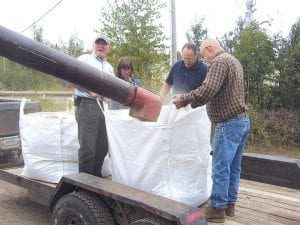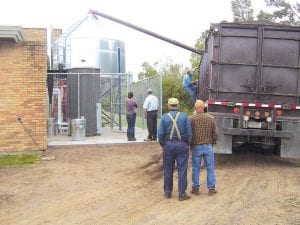Staff photo/Jane Howard More than 16 tons of wood pellets were delivered to Birch Grove Community Center Friday, September 25, 2009. Above: Community members are already helping share the cost of fuel delivery by buying some of the pellets for use in their own home pellet stoves. Pictured (L-R) Skip Lamb, Jill and Steve Schug, pellet stove owners, and Dexter Blood.

Friday, September 25, 2009 was an exciting day at Birch Grove Community Center. Community members, Birch Grove Community Center Director Jessa Wallendahl, a business rep, and Birch Grove Community School board member Skip Lamb were all on hand for the delivery of 16½ tons of wood pellets to be used in the building’s new Pelco biomass pellet boiler.
A delivery truck that also ships grain products brought the pellets from Valley Forest Wood Products in Marcell, Minnesota 30 miles north of Grand Rapids. After some fancy maneuvering, the truck’s chute was positioned over the building’s outdoor storage bin, which can hold up to 20 tons of pellets. According to Wallendahl, only about three deliveries will be needed a year.
The cost of shipping the pellets to Tofte was significant, but local wood pellet stove owners Roger Michaelson and Steve and Jill Schug are already helping Birch Grove offset that cost. They brought five-gallon buckets in a pickup and one-ton bags on a trailer to hold the pellets they will use to heat their homes. As more people invest in biomass pellets, the cost of freight for each customer will go down.
According to Don Buerkley, the Pelco dealer, a lot of trucking companies are switching to biodiesel fuel, which would make the cost of delivery less dependent on the cost of fossil fuel.
Buerkley would like to see the entire county get on board with wood pellet heating. Any lodge or business that uses hot water heaters that hold at least 80 gallons could benefit from a pellet boiler, he said. The system could efficiently provide heat to buildings within 300 feet of the boiler through underground hot water pipes. Likewise, any business with a swimming pool could easily replace its fuel oil or propane furnace with a pellet boiler to heat the pool more cheaply.
Pelco systems can accommodate buildings as small as 15,000 square feet and as large as 200,000 square feet. The new boiler is the smallest of three commercial sizes sold by Pelco, and it is a good fit for the 16,000-square-foot Birch Grove Community Center.
Since Cook County is full of wood that could be cleared to manage the forest and prevent fires, a pellet factory might be a practical investment. While a large-scale pellet factory could cost $10-20 million, Buerkley said, smaller pellet machines that could meet more localized needs are available.
Wallendahl anticipates the cost of heating the community center might be only half as much as last year, although the savings is somewhat dependent on the cost of freight.
One of the tricks to using wood pellet fuel is getting it from a nearby source to keep expenses down. Other pellet plants in this region are located in Deer River, Minnesota, and Superior, Hayward, and Ladysmith, Wisconsin. Right now, Wallendahl said, Howard Hedstrom (of Hedstrom Lumber Company) is hauling away chips that will be made into pellets and coming back with empty trucks. How nice it would be if those chips could be made into pellets locally.
Pellet production is regulated, and the moisture content in premium-grade pellets is 4% or less. Thepellets can be stored in bins for long periods of time, but they need to stay dry.
According to Buerkley, the boiler will produce about one metal trashcan’s worth of ash a week. It is potash, he said, which makes good garden fertilizer.



Loading Comments